“A poor widow brought a few eggs, canned meat and a piece of bread. You accept the assistance, you express your gratitude and then you cry”, said Rev. Makariy, Hegumen of the Univ Monastery
Sunday, 03 July 2022, 20:00 In the series “Little Stories of the Big War” we already focused on those locations, which became shelters for hundreds of internally displaced persons. Namely, Natalia Rybka-Parkhomenko shared her experience in organizing the war time hostel under the aegis of the “Les Kurbas Theatre”, while Oleh Halaidych elaborated on the experience of living in such shelters. Nevertheless, every new conversation time and time again demonstrates the uniqueness of life’s stories and the coming together of our people in their aspiration to help.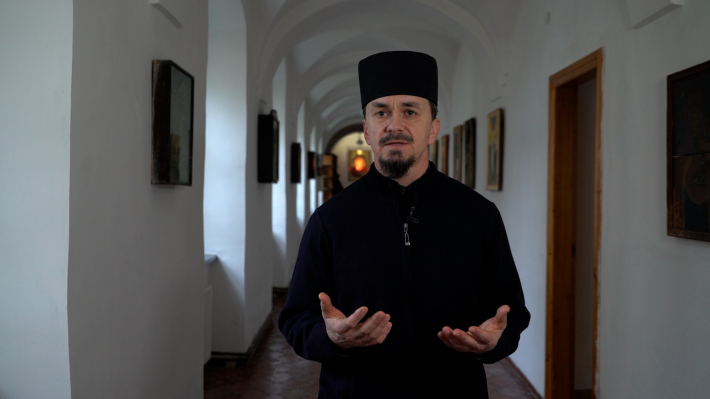
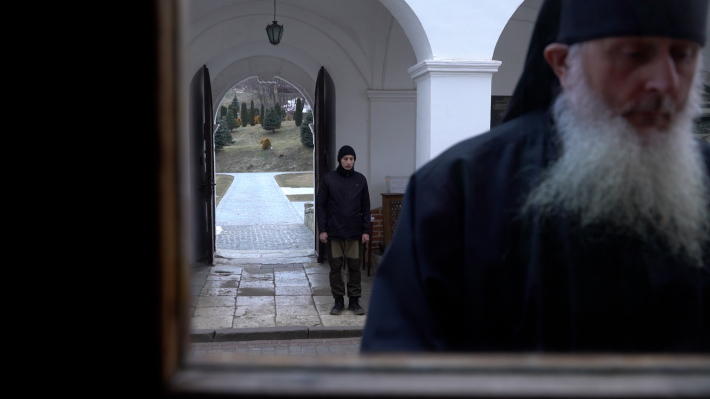
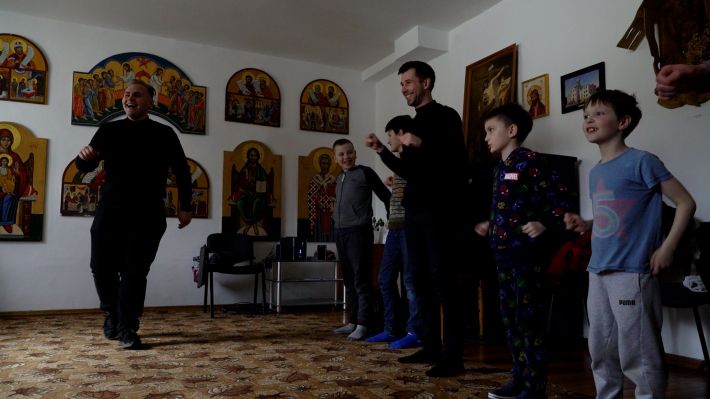
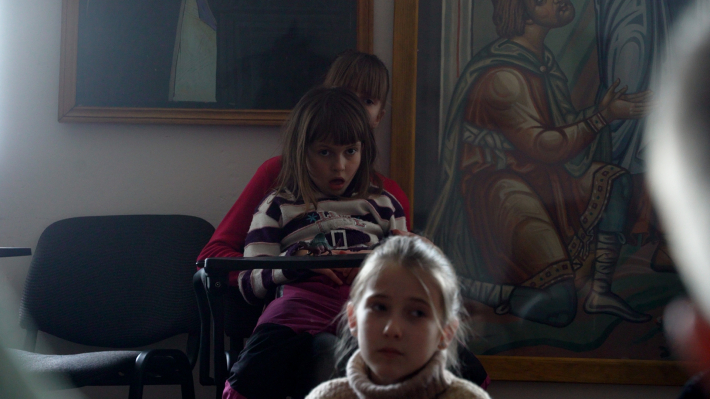
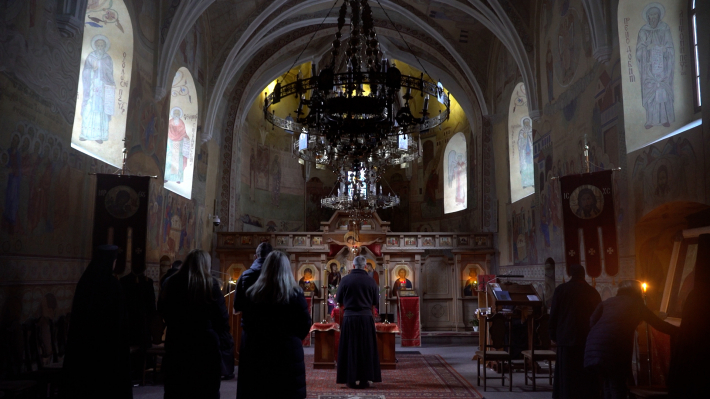
The war has presented us with many challenges, while God has sent even more people who are ready to accept these challenges in a dignified manner. Joining us today in conversation is the hieromonk and hegumen of the Holy Dormition Studite Monastery in Univ, Rev. Makariy Dutka, who will share with us his thoughts on Divine Providence, the human conscience, life’s unexpected curves and tireless help.
Father Makariy, how do you remember the first day of the war? What were your initial thoughts, feelings and concerns?
Like all citizens of Ukraine, we had been hearing about the possibility of russia’s attack and therefore we had certain trepidations. But no one knew when exactly it would happen. I recall having awakened at 5:00 AM, somewhat unexpectedly. At the monastery, we usually wake up at 5:30 AM. I felt a certain uneasiness inside. I logged in to the Internet and realized that the invasion had begun. At the outset, I had not yet comprehended the scope of all this and initially I had assumed that the fighting in the Donbas had escalated. But soon afterwards, I realized that the war had begun. Probably just like everyone else, I felt fear: fear for my country, fear for myself, fear for the monastery. I immediately informed my fellow brethren in the monastery and began tracking the news. During the early morning prayer service, I asked the brothers for their prayers. A lot of the fake news unfortunately instilled even more fear. We tried to pray as much as possible, in the hope that the war would not end on a tragic note for our country.
Father Makariy, prayer for a monk is a regular daily activity. You are perpetually in a state of prayer. When you first found out about the war, did any thoughts cross your mind regarding what needs to be done outside of prayer?
No, in the beginning there were no concrete thoughts and there was no specific plan of action. We all prayed, asking God through Christ’s prayer: “Oh Lord, Jesus Christ, protect our Ukrainian people, protect our country.” We didn’t know what the next specific steps would be, but we were galvanized and united, we listened to and followed the instructions of the government and of President Volodymyr Zelensky, we realized that the government is in place and on top of the situation. We had faith in our leadership.
Sometime around the third or fourth day – when the cities were being heavily shelled and people were fleeing en masse towards the border and into western Ukraine – we posted on our official Facebook page that we are accepting refugees. People started arriving at our monastery, and every day more and more were showing up. At one point, we were accommodating 30-40 people per night. We became a makeshift transfer point. People would arrive to sleep over and then they would continue their journey. Eventually, a group evolved, based on those refugees who decided to stay a little longer. Initially, these were residents of the Brovary region (a suburb of Kyiv). Subsequently, these were people from the city of Irpin, before it ended up under a blockade. These refugees started informing other people that they are doing well at the Univ Monastery; they encouraged their friends and relatives to join them. As a result, the influx of people increased continuously.
Were there people here who had originally planned to go further, but eventually ended up staying here?
Yes, some people are here for the fifth day already. They told us: “Father, there are nine of us. We would like to stay at your place for a little while and then we will move on.” They did not elaborate as to where they plan to go. But, from what I can tell, they like it here, which is why they decided to stay for a bit and they have encouraged their friends to come to the Univ Monastery.
Since the arrival of the refugees, what standard routine and what day-to-day activities changed at the monastery?
I don’t consider the mission of accepting refugees as some sort of burden for our monastery. Ecclesiastical law has not changed: we continue to pray as always and liturgies continue to be celebrated. In fact, the presence of lay people helps all of us to be more open. We feel that such a mission is vital for our people, for our Church. We share our love and attention with the people, all of us congregate at joint meetings and we communicate with the people. We share our concern for, and inquire about, the people’s lives and their fate. As a result, the people, in turn, ask us for spiritual guidance. This brings us, i.e. the monks, closer to the people.
Prior to the war, a team of journalists from the “Shuster Live” talk show had visited our monastery. A journalist by the name of Vasyl interviewed me about the fact how our Studite monks harbored Jews in the Univ Monastery during World War II. Then, sometime around the fifth or sixth day of the current war, it suddenly struck me that what I, at one time, could read in a book or view on TV, i.e. how our monks saved Jews – was now happening as our mission all over again. The only difference is that this time we are sheltering Ukrainians. Before this, I could have never even imagined that, as a 45-year old individual, I would be saving someone’s life just like our predecessors had done. We feel needy to the world, not only through prayer, but also via our actions.
Is there anyone in particular, who arrived from the war zone and made a deep impression on you in a special way?
There is one uplifting story, which at that moment when I had initially heard it, had instilled in me a great sense of faith and hope. A slightly elderly lady had told me that her husband had fought in the Soviet Army and then in the Ukrainian Army. As soon as the current war had begun, this lady’s husband joined the ranks of the Armed Forces of Ukraine. As an experienced soldier, he was inspired by the fighting spirit which is now so prevalent in our army. Her husband was impressed how these young men behave and carry themselves as soldiers on the front lines. He was equally struck by their high morale, forged by a strong sense of imminent victory; their equipment and weaponry made a lasting impression on the seasoned veteran as well. This lady admitted to me that when her husband shared his thoughts with her, she gained hope that our army will prevail. This was at the time when my own spirits had reached a low point, because every day I kept hearing about our terrible casualties. However, this lady’s story renewed my sense of belief in the fact that indeed we will be able to resist this powerful enemy.
Father Makariy, we find ourselves in a very particular moment in time. It is now the beginning of Lent, a time of forgiveness. I am not aware if ever in our Ukrainian history we have had such a challenge regarding the act of “Forgiveness”. What is your response to this?
I hope for myself and for all our citizens not to foster in one’s heart and one’s soul feelings of hatred towards our enemy. We need to understand and truly fathom, what a deep and dark abyss they find themselves in. Very often, they themselves are not aware and do not realize what they are doing. We must not encourage nor stimulate hatred inside of ourselves, in order to avoid being possessed by evil. We should discard and ignore all of those shameful words, which we hear all around us. My fellow brothers and I understand why our soldiers sometimes use coarse language when they find all of those dead bodies and witness the atrocities perpetrated by the russian soldiers. But we must maintain an all-embracing type of love, because these people are brainwashed by russian propaganda. There is no need to foster hatred towards people themselves. We need to overcome the spirit of animosity and hatred towards other people and other nations.
Father Makariy, please tell us a little bit about the people who arrive here on a daily basis: where do they hail from, what are their families like and what are the average ages of their children?
Over the course of these last few days, a more stationary group of refugees has gathered at the monastery. Right now we have 90 people. We are accommodating them in two welcoming premises. One building is adjacent to the monastery. The other facility is the former retreat center, which is situated directly next to the monastery’s entrance. People are arriving from the various hotspots of Ukraine, namely such towns and cities as: Irpin, Brovary, Melitopol, Mariupol, Kyiv, Kramatorsk, Kharkiv. Each one of them has a story. Some of the people have children. Of the 90 people here now, about 20 are children. There is a boy with cerebral palsy, who is under the constant care of his mother. The people are very open and sociable. I truly believe that the Lord sends us very good people. Many of those who had arrived were initially somewhat confused and perplexed with tears in their eyes, because, for all intents and purposes, they had just escaped from hell on earth. It’s difficult for them to open up. But then when we start to make pyrogies, or tidy up the living quarters or the refectory or wash the dishes – people open up, they begin to smile and communicate with my fellow brethren and priests. On a couple occasions, they have called upon me for spiritual guidance and have put forth various types of questions. At this time in our monastery we also have fellow brethren-seminarians from the Kyiv-based seminary, who originally hail from Melitopol. These seminarians have daily meetings with the children during the day and with the adults in the evening.
We all perfrom chores together and pray together. And the people appreciate this. They have needs, for someone to be constantly by their side, for someone to inquire about the welfare of their relatives. At our monastery, there are two sisters with their own children; the husbands are soldiers on the frontlines. One day I asked one of the sisters: “Yulia, how are things? What’s the news from the front lines, according to your husband?” She briefly updated me on the situation and then I suggested that we pray for the safety of her husband and her father, who is also fighting. We said the prayer “King of Heaven” together. And then Yulia said: “Father, can I embrace you?” And then she simply gave me a sincere hug.
Sometimes, when someone tells me a personal story, I shed tears. Some of the stories are very painful. Today our monastery was asked to accept a family from Irpin. A pregnant woman with a small child. They are heading towards the western border of Ukraine. When you hear such stories, you say to yourself: “I’ll go climb up to the attic and sleep on the floor, because how can you not accept and accommodate such people?” These are our people.
When the war broke out, we in the monastery were not ready for it. We never practiced stockpiling large amounts of food and supplies. Usually, once every two or three weeks we would drive to the “Shuvar” market in Lviv to purchase food. So, when the massive influx of refugees had begun, I assessed that in two-three days we will need food for approximately one thousand meals. We make an effort so that the people are well-nourished; they should not sustain themselves on porridge alone. We prepare the first course and the second course, and we make sure that the meal also includes something hot. On our monastery’s Facebook page, I appealed for food donations, posted my telephone number and in a couple of days we had amassed eggs, grain, flour and bread.
When the population heard that the Univ Monastery had provided shelter to numerous refugees, people began calling our monastery, depositing donations into our bank account and delivering food to us. Today I was truly moved, when a poor widow − approximately 60-65 years of age, who lives in our village − came to the monastery with a large bag filled with eggs, canned meat, a piece of bread and she even handed me 200 Hryvnias. She brought all of this in order to help others. You accept the assistance, you express your gratitude and then you cry. We are well-organized as a people. I posted an appeal on the Internet: Let’s work together to overcome the enemy, because only in unity thrives the strength of our people, just like our Ukrainian song says. And when we will be united and fighting in unison, the victory will be ours. There is no need to doubt this. One must simply exit the zone of personal comfort. The Lord provides many ideas and possibilities. God will give His blessing. Those of us who have the capability – take in refugees. I even announced that the Univ Monastery is ready to donate food, we have quite enough and can share.
Are there people in the village who are taking in refugees?
Yes. In fact, very often when I see unfamiliar people on the territory of our monastery, I immediately begin to assume that perhaps these are refugees who have fled the calamities of war. Our facilities are already filled to capacity and sometimes we just don’t know where to place newly arrived refugees. So, when I see a new group of people, I automatically begin figuring out where to settle them. For example, today, my fellow Reverend Father and I saw a group of elderly women who were carrying bags. I immediately began thinking of how to find housing for them, while the Reverend Father says to me: “No need, these women are from our village”. They were going to Vespers. And each one of them was carrying two big and heavy bags of food for our refugees. This was such a moving experience that I became convinced over and over that the Lord our God cares about everyone, cares about us, cares about the refugees and cares about Ukraine.
The interview was conducted by Petro Didula on March 10, 2022
Media partners of the project: The Ukrainians, Reporters, Espreso.TV.

We can imagine what the prayer of the prisoners in the Russian torture centers in the Ukrainian Kharkiv region was like – Head of the UGCC on the 206th day of the war 17 September
A vast cemetery, a mass burial, was found near the city of Izyum, in which more than 400 innocently killed and tortured people have already been...

